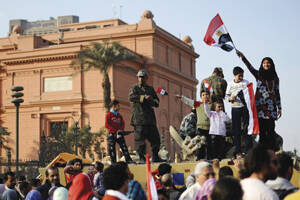The leader of Coptic Catholics in Egypt has spoken of a “historic opportunity” provided by last month’s revolution, saying that the country now stands on the brink of achieving the “dream” of a democratic system. Cardinal Antonios Naguib, Patriarch of Alexandria, welcomed the interim military regime’s stated aim of dismantling the autocratic government built up by Hosni Mubarak, who resigned as president on Feb. 11.
Signaling his strong support for the first declarations of the temporary administration that replaced Mubarak, Patriarch Naguib highlighted the importance of the military regime’s commitment to a civilian system of government. Patriarch Naguib said, “Moving towards a civil, democratic government, rather than a religious or a military one, has been our hope for a long time—it has been a dream.”
Patriarch Naguib noted that the current expectation is that the Egyptian military will quickly facilitate new elections to help recast the nation’s political system. In a country with 200,000 Coptic Catholics and about eight million Coptic Orthodox, the patriarch said, “We will encourage very much all the members of the church to participate in the elections. It is for us an historic opportunity.”
Other Coptic bishops in Egypt welcomed the downfall of Mubarak and said that both Muslims and Christians were uniting behind the movement for change. Bishop Antonios Mina of Giza said: “For the last few decades there has been a lack of freedom. It was not human. We are pleased with what has happened, for it gives us the opportunity for a fresh start.”
Patriarch Naguib downplayed fears that political uncertainty would play into the hands of extremists and groups like the political movement Muslim Brotherhood.
Emad Shahin, of the Kroc Institute at the University of Notre Dame, is also hopeful about Egypt’s future. In February he traveled to the country for a two-week visit, during which he observed activity in Tahrir Square and participated in meetings to discuss the future of the country. He said there is a “collective desire” to work toward a platform that will benefit all Egyptians. “Egypt is now becoming a huge workshop where the youth and N.G.O.’s and intellectuals and activists are trying to look to the future and determine how to build a new Egypt,” he said. Shahin said their hope is not simply to establish a democracy but to build a “free, democratic, liberal and humanitarian Egypt for Egyptians.”
The strategic interests of the United States and concerns about maintaining stability in general have overshadowed Egyptian grievances about the Mubarak regime, Shahin said. With the fall of the regime, Egyptians are hearing contradictory and confusing messages from the White House and the State Department regarding American support, he said. “The people who made this revolution and sacrificed their lives are not expecting much from the United States, although they are not anti-American,” Shahin said. “America can help indirectly through N.G.O.’s, but the best thing America can do is to let Egyptians chart their own democratic course.”








